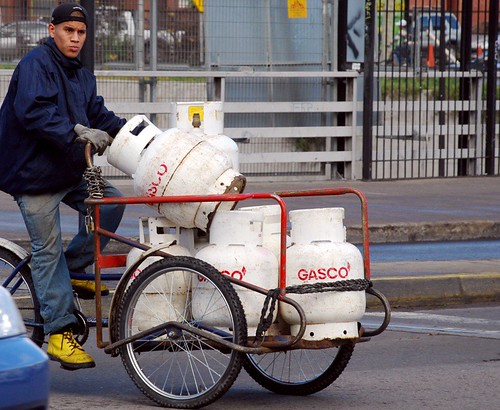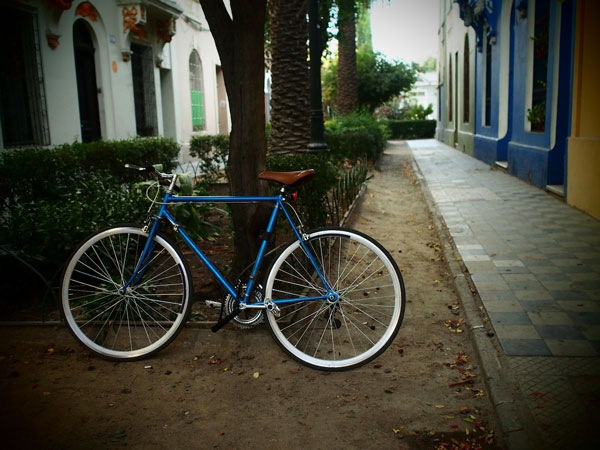The contrasts between old and new, practical and superflous, modern and old-fashioned never ceases to amaze me. Maybe that’s why I find in Chile an utterly endless supply of blog (and other writing) fodder.
Today’s lesson is about regulation, rules and the following thereof.
Our first installment finds me in the grocery store, buying an onion to make a roasted squash soup. I go to the weighing station and tell the woman, “No, I don’t need a bag, you can put the sticker directly onto the onion.” And she shakes her head sadly, indicating no, and fishes out a bag from under the counter where the scale is located. She carefully wraps my onion, which by all accounts comes pre-wrapped, you know, with the skin and all. As she applies the sticker carefully to the outside of the bag, ensuring that I will need scissors to get at the onion, she explains that it’s a new supermarket policy: all produce must be bagged.
I’ve been known to be argumentative, it’s true. But I’m not going to argue with a woman who makes maybe $500 a month, which isn’t enough to live well on, not even here, about not having a bag. I know she’s following instructions, and I’m not going to hassle her. She feeds me a line about people eating the produce en route to the cash register (perhaps themselves earning even less than $500 a month, who knows), and I mimic the facial expression of a person who’s just taken a bite of a raw onion (did I mention the skin?).
Onion in bag and bag in hand, I picked up the rest of my essentials and commenced to waiting in the world’s longest line because it was 8:30 on a weeknight, and though you wouldn’t think it, this is prime downtown supermarket time in Santiago. Take note.
Later on that evening, as I was walking into the house, the gas man had arrived. In Chile there are two ways to fire up your stove, one with gas de cañería, which is municipal gas. It comes piped into your house, and with hoses is fed into your stove for all your cooking pleasure (See roasted squash soup, above). The other possibility is that your gas runs on gas from a balón (canister). Periodically these will run out, filling your house with a gaseous smell, and requiring you to call one of these gents to come and please bring you another one because the squash soup is only half-cooked, and you’re getting nibbly.
There are also trucks that come with the same, announcing their arrival with a pingapinga on the gas tanks with a wooden stick. People sometimes open their windows and shout out to make them stop. Oh, urban life.
So, the gasman. As I’ve mentioned before, the elevator in my building is one of those old-fashioned jobbers, where you need to ask what floor people are going to and punch in the buttons one by one. Poor elevator, can’t remember more than one floor at a time. So the gasman and I came into the elevator together, and I said to him, as is the custom “A qué piso vas?” (what floor are you going to), and he said, “sexto,” sixth. To which I raised my eyebrows. You see, balones are illegal above the fourth floor in Santiago, which is probably because of fire truck ladder lengths or something equally encouraging. Hmmm, I said. “So that law about no balones above the fourth floor?” And the gasman shrugged, and said he’d brought balones up to the fourteenth floor of other buildings. I confessed I have one, too (though mine is for the gas heater, not the stove), and we shrugged our shoulders in unison, and then both got off the elevator, the gas man lugging the heavy gas canister behind him.
So my contrast point of the day was born: Let’s flout the rules when it could lead to dangerous gas explosions and death and dismemberment, but if someone wants to eat a raw onion in the supermarket? This must be stopped!
So, dear reader, what curiousities have you seen today?











I think I have lived here so long that nothing seems unusual any more.
Laws in Chile are nearly always pushed through Congress marked ‘urgente’ as an emotional response to a specific situation. Witness the present organ donor debate. So the gas canister law probably responded to some fire above the fourth floor that the firemen could not reach. It was probably shoved through the hoops so fast that no one wondered what the residents above that level would do if they needed gas. The response to this sort of law by the general population is to ignore it. Since there are never enough people checking up that the law is enforced, it is a safe bet no one will be fined.
I had a friend who rented a penthouse flat in Providencia and he had a huge open fireplace. Did you know that was legal? Above a certain floor you can have an open fire (but not a gas canister). He could not use it on days when there were extra restrictions because of air quality but otherwise it was fine. I guess that’s my contribution!
The bagging veggies rule really bothers me too. I take the stickers off of old bags and bring them back in the supermarket.
I’m waiting for someone to stop me because old bags are illegal.
That’s a really kooky situation! I guess there are curiosities everywhere if we are open to seeing them. I haven’t been out to observe any today but I’m sure I will and I’ll let you know! Great blog, by the way.
@ Bystander, I see you here all the time. Do you have a blog? A place where we can catch up on you? Shoot me an email if you want to do the face-to-face thing sometime.
@ Still Life, glad to see you back on the blogging circuit, and you have way more patience than I do with those tiny stickers (and a better bag-tying technique if you’re able to reuse!). The feria is good for this, they don’t care what you do/wrap, etc.
@ flygirl, thanks for the visit, the comment and the compliment! And now I’ll have that song in my head for the rest of the day. A fly girl, a fly girl, a flyflyflyfly flyyyyygirl. Yeah, you can take the girl out of Brooklyn…
Oh the unnecessary bagging of certain vegetables! I fight the excess bagging- here in Angola, and I did it in Latvia too. We bring reusable bags to the grocery store too, and they always try to make us take the store bags, but we don’t, but Joel (being the one who does the bagging, while I do the paying) always has to argue with the other baggers mightily!
This is all a very nice slice of expat observation and all, but could we TAKE A MINUTE TO LOOK AT THAT GUY’S BRIGHT YELLOW SHOES?
Okay then.
@ Pam. I think my neighbors (including the guy with the very whistly teakettle) almost just hopped in to see what all the fuss was about with the guffawing and all. You win for making me LOL so early (your time) and so loud!
i have made the same argument in the grocery store about bananas!!